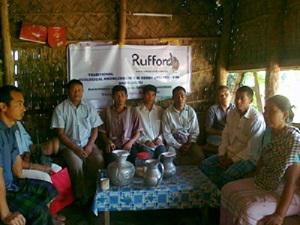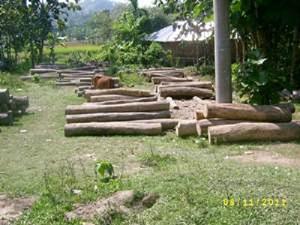Md. Danesh Miah
Other projects
4 Apr 2013
Trade-Offs Between Forest Conservation and Livelihoods of the Forest Dependent People in the Chittagong Hill Tracts: REDD + Strategy Development in Bangladesh
The project aims at exploring the traditional ecological knowledge/practice of the forest dependent peoples, which can be useful in sorting out the REDD+ strategies in Bangladesh.

Meeting.
Reducing emissions from deforestation and forest degradation, and enhancing forest carbon stocks (REDD+) can generate cost-effective quick reductions in global greenhouse gas (GHG) emissions. It can simultaneously address climate change and rural poverty, while conserving biodiversity and sustaining vital ecosystem services. Traditional Ecological Knowledge (TEK) of the forest dependent peoples can be an important tool to implementation of the REDD+ in Bangladesh. The research aims to find out the TEK of the forest dependent peoples living inside the tropical semi-evergreen forests in Chittagong Hill tracts (CHTs) of Bangladesh. Interdependence of TEK and REDD+ implementation will be carefully judged.

Logging.
The visualization of TEK of the forest dependent peoples regarding forest biodiversity use, livelihoods vulnerability will contribute understanding the range of involvement of the peoples for forest conservation. Identification of trade-offs between forest biodiversity use and carbon benefits will contribute to sharing the carbon benefits with the forest peoples. Identifying alternative livelihoods will be important for diverting forest dependent peoples from overusing the natural forests. All of these will contribute adopting REDD+ program in the selected forest areas of Bangladesh along with the conservation of forest biodiversity and livelihood development of the forest dependent peoples.
The study will be conducted in Rangamati Sadar Upazila (Local government unit under a district) of Rangamati district under CHTs of Bangladesh through stratified random sampling technique. The ultimate sampling unit will be households in villages. The study will be conducted involving a complementary ethnographic analysis and socially and culturally sensitive TEK gathering method. The study will include physical observation and ethnographic field notes. However, it will consist of structured and semi-structured data gathering of community-based information. For the study, TEK of a tribal community, Chakma living inside the tropical semi-evergreen forests will be sampled purposely as a case study.
The outcomes of the project in the selected forest ecosystem will help plan the REDD+ project strategies. TEK for biodiversity conservation and alternative livelihood practices will help the planner how the forest dependent peoples will be involved in the REDD+ program. Identification of trade-offs between forest biodiversity use and carbon benefits will be important clues for sharing the carbon benefits with the forest peoples. Identifying alternative livelihoods will be important for diverting forest dependent peoples from overusing the natural forests. The climate change mitigation policy makers, forest department and local NGOs can use the expected outcomes for planning REDD+ and forestry development in Bangladesh.